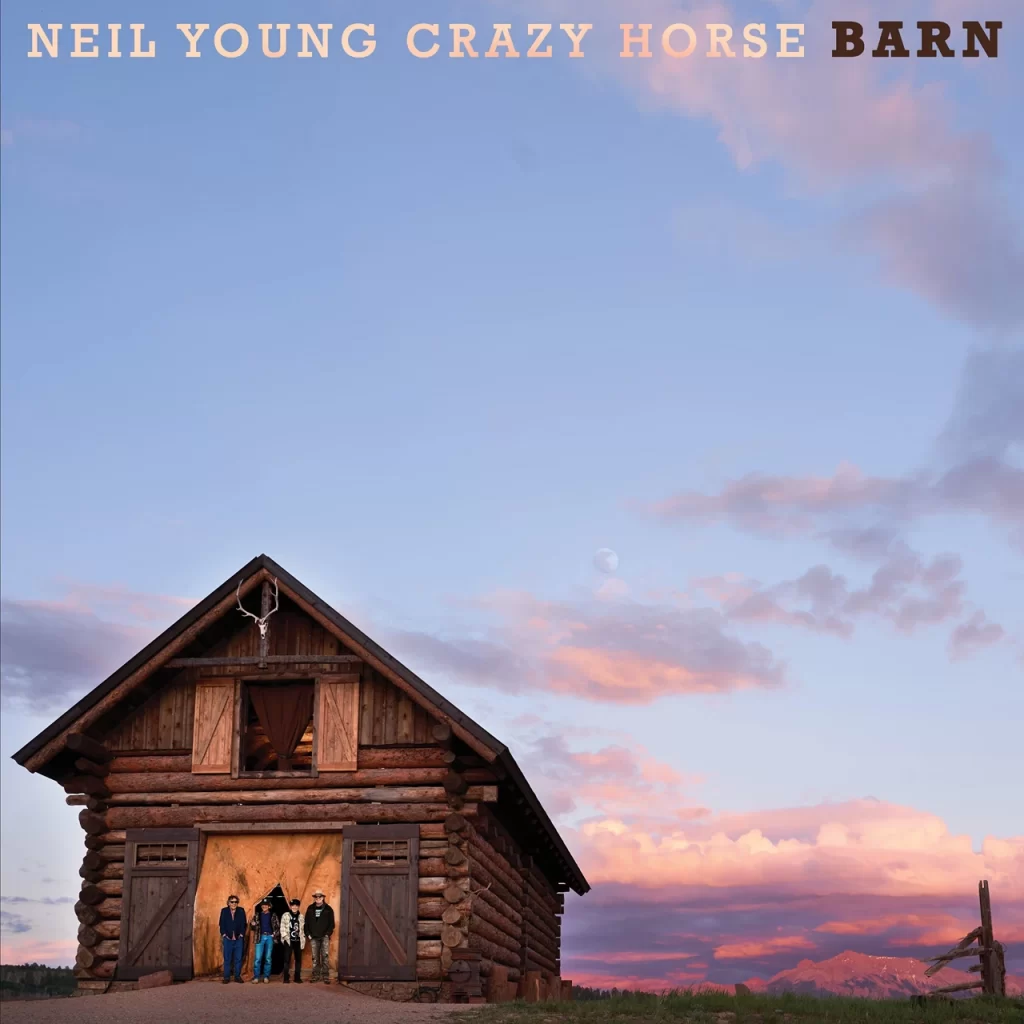
Barn is Neil Young’s forty-first album in a career that has taken in everything from solo acoustic performances to manic, full-band avalanches of sound across the years. A genuine artist, Neil Young has never followed trends, preferring to carve out his own unique path, untouched by the ravages of time and strangely timeless as a result. Barn sees Neil back in the saddle with Crazy Horse (Ralph Molina, Billy Talbot and Nils Lofgren) and, as is so often the case, the influence of Neil’s longest-standing sparring partners helps to push the record out from the pack.
The album opens on a reflective note with the harmonica-soaked loveliness of Song Of The Seasons, a Cajun style lament with acoustic guitar and subtle percussion very much the order of the day. It neatly sets the scene for an album that reflects on life and love across its ten tracks, although there’s still plenty of time for the band to indulge that gnarled tone for which they’re justly famous. Neil harks back to his past on the splenetic rocker Heading West, which kicks off with a blazing riff that just seems to spit fire from the amplifier. Nailed by a tough beat and given greater heart by a piano line that is occasionally allowed to permeate the murk, it’s a surprisingly svelte piece, only just escaping the three-minute mark, before giving way to the sarcastic blues of Change Ain’t Never Gonna – a blistering commentary on the current state of the world’s green agenda. Necessarily militant, Neil only just tempers his outrage, and the barely coherent harmonica – striving for the notes more often than it hits them – feels a natural extension of an organic piece written and recorded in a flurry of invention, rather than practiced into polished irrelevance.
Lyrically, Barn certainly sees Young on fire and his pointed Canerican, which questions the increasingly nativist impulses of the American electorate, is savagely direct. Understandably, the track is driven by blazing guitars, further underpinning Young’s disdain for exclusive social reforms in a country founded on the principles of freedom and openness. It’s a bold move, but when you consider this is the artist who toured Let’s Impeach The President during the Bush era, it’s not exactly a stretch. If I have any criticism of Canerican at all, it’s the fact that it fades out when you could easily imagine the session running on into infinity. Perhaps that’s a strength, because it does help to keep the album moving apace, but I’d love to hear an uncut version one day. Love sits at the centre of the next track, Shape Of You, which sees Neil crooning in lovelorn fashion over boogie-woogie piano, recalling the ramshackle charm of the Stones and reminding the listener that sonic perfection will always come second to the sound of a band feeling their way through a song as if for the first time. The first side ends with the lights burning low and They Might Be Lost, a dusty blues with wistful harmonica and a shaky vocal from Ol’ Shaky. It’s a vulnerable and rather beautiful piece, and it signifies the strong emotional undercurrents that pulled this record together.
Side two kicks off with a belter, Neil and the band unleashing a tidal wave riff on Human Race as Neil asks “who’s gonna save / the human race / where are all the children / gonna run and hide / from the fires and floods”. Direct, but necessarily so, it’s heartening that Neil retains a passion for saving the human race where so many artists have collapsed into a fatigued nihilism. The track is further enhanced by the electrifying lead work that scratches its surface, recalling the majesty of Sleeps With Angels in the process. The brief Tumblin’ Thru The years is as gorgeous a piece of music as Neil has ever penned, breezing through its runtime with gentle nostalgia and genuine love. However, Neil’s contrary spirit is never far away, and the album’s lengthiest outing follows in its footsteps. At eight-and-a-half minutes, Welcome Back stretches out into the distance, Neil seemingly finding his way around the solo as the band lay down a dusty blues that evokes the vast open plains of the America they love so well. A haunting road trip spent in the company of veterans, Welcome Back is the album’s heart, and it sits comfortably alongside the epics with which Neil and his band have made their name over the years. If Welcome Back is the album’s heart, then Don’t Forget Love is surely its soul. A heartfelt plea, it sees Neil and his band close the album with a sweet piece complete with falsetto vocals and the warm caress of the keys. It brings the shades down on an album that sees Neil and his band move deftly between gritty rockers and heartfelt balladry with consummate ease.
Fans of Neil Young have come to expect the unexpected. The last decade alone has seen a remarkable amount of activity from Ol’ Shakey, and there’s no sense of his creative flame dimming here. A well-proportioned album that sees Young and his band exercise an uncharacteristic restraint, Barn offers ten tracks of love and loss that hit home with genuine force and real poignancy. Raw and unflinching, Neil Young remains one of the few artists still willing to give the audience what they need over what they want, and for that alone, he remains one of the most important figures in rock music today. 10/10



